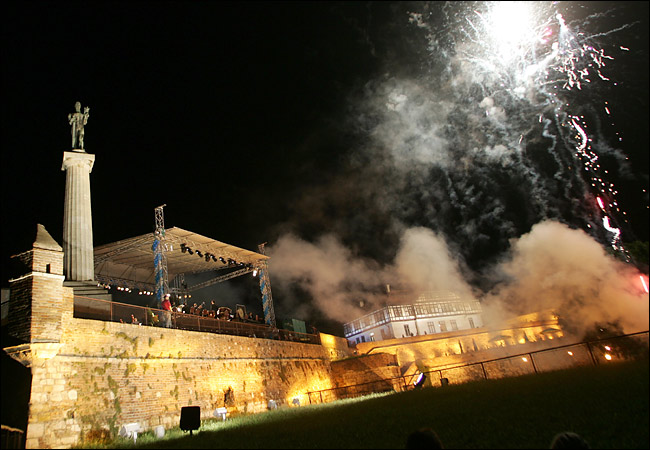Belgrade Rocks
(Page 3 of 5)
"Anywhere else in the world, you wouldn't be allowed to have something like this in a historical monument," a bearded film student says one night at Bassment, a club that operates against the Kalemegdan battlements in warm months. "Not Belgrade."

A German D.J. duo called Moonbootica has the crowd jumping up and down to electronic music on ground that may once have seen battles for the city's soul.
Like Kalemegdan, the rest of the White City - the literal translation of its Serbian name, Beograd - reaches the zenith of its energy at night. Propelled by some of Europe's cheapest cocktails and taxi rides, the after-dark adventurer discovers that the surprisingly friendly and safe terra incognita of Belgrade holds a bounty of hidden hipster speakeasies, raucous rock 'n' roll dives and nightclubs boasting global talent.
Pick up the glossy entertainment magazine Yellow Cab at the slick bilevel Tribeca bar (Belgraders like to imagine their city as the Slavic counterpart to New York) and you find page after page of listings for exhibitions, theater events, concerts and club nights. If the great Yugoslav unifier Tito staggered from his hillside tomb, he'd find himself in the Continent's last great undiscovered night-life scene.
On a late fall evening, some weekending Britons follow a muffled electronic beat through an undistinguished door along Boulevard Novembra 29, descend a poorly lighted staircase and emerge in a basement bar stuffed with ugly oil paintings, retro-tacky lamps and other vintage touches. To judge from the d�cor, it's likely that there's a grandmother in some remote Balkan corner filling out a burglary report. The name of the bar, the Association of Globe-Trotters, seems fitting: Only the most motivated travelers can hope to discover it.
"This place you can only find if somebody brings you here," says the bartender, Dejan, serving up bottles of Montenegrin Niksicko Beer and explaining that the owners want to limit the establishment's clientele to loyal cognoscenti. The country's prime minister, Vojislav Kostunica, has been known to stop in, he adds.
The secret bar phenomenon is very much a trend in Belgrade. Some, like the aptly named nightclub Andergraund, occupy subterranean spaces in Kalemegdan Park. Others, like the cocktail lounge Ben Akiba - where a lively crowd of people in their 30's toasts "Ziveli" amid loud disco and funk - are concealed in private apartments.
"Where are all the people between 2 and 6 a.m.?" playfully asks the online entertainment site Belgradeinsideout.com, one of the rare English-language guides to the city. "They are probably hiding in some places where you can't find them."
Near Slavija Square on a Friday night, however, ranks of splendidly grimy music fans emerge from the woodwork to follow the buzz-saw sound of melodic punk rock reverberating from the outdoor stage of SKC, the CBGB of Belgrade. The every-punk-and-his-mother crowd arrives by the hundreds, chugging Lav Pivo (Lion Beer) from two-liter bottles. Two unshowered rock chicks in Converse high-tops carry a friend who has passed out and lies horizontally in their arms like a drunken log. These are the apostles of the elder statesmen of Belgrade's rock universe, the Partibrejkers.
For a place that has suffered as many privations and embargoes as Belgrade - where rock was a key opposition force during the lean Milosevic years - the locals exhibit musical knowledge as extensive as anywhere in the West. Scanning the rack of top-selling albums at the IPS music emporium, you find the White Stripes, Audioslave and other bands that grace top music magazines in America and Britain.
"They're remarkably well-informed," says Nick Hobbs, a concert promoter who has brought Kraftwerk, the MC5, John Spencer Blues Explosion and other staples of American vinyl junkies to Belgrade in recent years. "We can do things in Belgrade that we can't do anywhere else."
The result is a fertile musical landscape full of acts that would probably be alt-rock icons in countries with better record companies and higher disposable incomes: the hard-driving Lira Vega; the indie-electronic Darkwood Dub; the subversive sonic experimenter Rambo Amadeus.
On stage, the Partibrejkers tear through a succession of Stooges-meets-Kiss anthems while the throng pumps its fists and yells "Oh, Yeah!" Having endured more than two decades of the vicissitudes of their homeland - the post-Tito comedown, the wars of the 1990's, the economic and political uncertainty under the new leaders - the Partibrejkers are perhaps one more inspiring symbol of Belgraders' endurance. "When you have a strong link to the source of life," the group's guitarist, Nebojsa Antonijevic, said before the show, referring to his passion for music, "the outer situation can't deter you."
Previous Page 1 2 3 4 5 Next Page